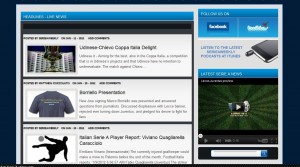Soccer Terminology in the Mother Tongue
A few words from the editor - this week I’m pleased to welcome back guest writer Steve Amoia to the pages of SerieAWeekly. With the start to Serie A rapidly approaching, Steve has kindly put together a volume packed list of need to know Italian terms for the those less familar with league and language. All planning on viewing football or soccer from Italian Serie A I’m hoping will love the trip back to school, enjoy students!
Guest Writer - Steve Amoia for Serie A Weekly
Calcio is derived, to the best of my knowledge, from the medieval game of “calcio fiorentino.” Or, Florentine kickball. Calcio (cahl-choh) does not literally mean “football or soccer.” In Italian, “calciare” means “to kick.” A soccer player is a called a “calciatore.” When Italians translate the word into English, they use the common term of football. Calcio is a great part of Italian culture, and the word represents their unique identity in the world of international football. Another word close to the hearts and souls of Italians is “Azzurri.” (Aht-zoor-ree.)
Here are some Italian soccer terms, along with some related topics, that will help you to better understand calcio italiano.
Guarda. (Gwarh-dah.) Ascolta. (Oz-colt-tah.) Impara. (Eem-pah-rah.) Watch. Listen. Learn. Witness the passion of calcio italiano.
Coaches
Allenatore: Head coach. Pronounced “Ah-lane-nah-touray.” From the verb, “allenare,” which means to train, strengthen, or invigorate.
Allenatore in secondo: Assistant coach. Pronounced “… Een say-cone-doh.”
CT or Commissario Tecnico: This term is reserved for the head coach of the Italian National Team, who is currently Cesare Prandelli. It is pronounced “Chee-Tee.” Or they may refer to him as “Il CT.” The longer term is pronounced “Com-me-sair-ree-oh Take-nee-coh.”
Il Mister: Is another term for the head coach. Yes, it is an English word but is pronounced “Eel Meester.” This is out of respect for the early British coaches who taught the game on the Italian peninsula. AC Milan (not Milano) was founded by British enthusiasts and they named their club the “Athletic and Cricket Club of Milan.” But you pronounce the name “Ah-Chee Mee-lahn.”
Referees
Arbitro: (R-bee-troh). Sometimes, we see the term “direttore della gara,” which means “director of the game.” Pronounced “dee-ray-touray day-lah gahr-rah.”
Guardalinea: The linesperson or what is now commonly referred to as the “referee’s assistant.” You would pronounce this word “Gwardah-lee-nayah.”
Players
Ala(e): The wingers. Pronounced “Ah-lah or Ah-lay.”
Attacante(i): The strikers. Pronounced “Ah-tah-kahn-tay(tee).”
Calciatore: Soccer player. Pronounced “Cahl-chah-touray.” This word is very close to cacciatore, which means “hunter.”
Capitano: The team captain who wears the armband. Pronounced “Kah-pee-tah-no.” The captain of the present Azzurri team is Gigi Buffon of Juventus FC.
Capocannonieri: This is the leading goalscorer in the Serie A. Pronounced “Kah-poh-kahn-nohn-yehr-ree.” For the 2010-2011 season, it was Antonio Di Natale of Udinese.
Centroavante: The classic center forward (#9) such as Zlatan Ibrahimovic. Pronounced “Chain-troh-ah-vahn-tay.”
Centrocampista: Midfielder. The midfield is referred to as the “centrocampo.” The word “campo” (kahm-poh) means the “field or pitch.” “Pista” (pee-stah) means racetrack. Literally, the one who runs around the midfield.
Difensore: Defender. Pronounced “Dee-fane-soar-ray.”
Fantasista: A cross between a classic #10 and a creative visionary. Roberto Baggio best exemplified this position.
Giocatore: Player. Pronounced “Joe-cah-touray.” The word “giuoco” means “play.” Pronounced “Jaw-oh-coh.” Derived from the verb, giocare. (joe-cahr-ray.)
La Regista: The literal meaning is “movie director.” Usually, the #10 player. The creative playmaker. Pronounced “Lah-Ray-gee-stah.”
Lo Stopper: One or both of the two central defenders. Pronounced “Low Stow-per.”
Portiere: Goalkeeper. Pronounced “Poor-tee-air-ray.”
Terzino: Fullback. Pronounced “Tear-zee-noh.”
Trequartista: This is a position that hangs behind the attackers, and acts as a bridge between them and the midfielders. Pronounced “Tray-kwarr-tee-stah.”
Common Terms From The Game
Ammonito: Warning. Pronounced “Ah-moe-nee-toh.” Usually heard when a player receives a yellow card. When he receives a red card, he is “Espulso.” “Ace-pool-soh.”
Autogol: Own goal. Pronounced “Owl-toe-goal.”
Cartellino Giallo/Rosso: Yellow/red card. Pronounced “Car-tay-lee-no jahlow/row-soh.”
Calcio d’angolo: Corner kick. Pronounced “Cahl-choh-dan-go-low.”
Calcio di punizione: Free kick. Pronounced “Cahl-choh dee pooh-neez-zee-oh-nay.”
Catenaccio: Literal meaning is “door bolt.” This refers to a defensive system that focuses on very tight marking, with rapid counter attacks. Internazionale (Inter Milan) introduced this system in the 1960′s. Pronounced “Kah-tay-nah-choh.”
Falo di mano: Hand ball. “Falo = foul.” Pronounced “Fowl-loh dee mah-noh.”
Fischiare: To whistle. Also, I fischi. What supporters do when they don’t like something on the pitch. Common to North American booing or jeering. Pronounced “Fee-ski-ah-ray and E Fee-ski.”
Forza: Go! Usually followed by the name of your team. Such as, “Forza Juve or Forza Azzurri.” Pronounced “Fort-zhah.”
Fuorigioco: Offside. Pronounced “Fwour-ree-joe-coh.”
Il Derby: A game between two teams from the same city or region. Pronounced “Eel Dair-bee.” For example, AC Milan and Inter Milan. AS Roma and Lazio. Juventus and Torino. When Inter plays Juventus, it is called “Il Derby D’Italia.”
Il Modulo: The module or system that a coach employs. In the Serie A, most teams use a variation of the 4-4-2 or a 4-3-2-1. Some play a 4-3-3 or a 3-4-3, which is more attack-oriented. A few play with 5 midfielders. Pronounced “Eel Moe-duh-loh.”
Il Pallone: The ball. Pronounced “Eel Pah-low-nay.” Also can be called “La sfera.” Pronounced “Lah sfair-rah.” Or La Palla. “Lah Pahl-lah.”
Il Palo: Either of the two poles of the goal. Pronounced “Eel Pah-low.” When a shot hits the pole, it is called a “palo.”
Il Tridente: This is when the coach uses three attackers, or a “trident.” Pronounced “Eel Tree-dayn-tay.” As in the 4-3-3 referenced in il modulo.
Lancio in profundita: A long pass played into open space. Pronounced “Lahn-choh een pro-fuun-dee-tah.”
La Classifica: The table of current standings in the Serie A. Pronounced “Lah Clah-see-fee-cah.”
La Curva: The curve. The areas directly behind each goal. These are places where the more fervent home and away supporters sit or stand during games in Italy. Commonly known as the “Curva Sud” and “Curva Nord.” Pronounced “Coor-vah Sued and Coor-vah Noord.”
La Panchina: The player’s bench. Pronounced “Pahn-kee-nah.” Sulla panchina = “On the bench.” Pronounced “Sue-lah pahn-kee-nah.”
La Partita: The game. Plural form is Le Partite. Pronounced “Lah Pahr-tee-tah or Leh Pahr-tee-tay.”
La Porta: The goal mouth. Pronounced “Lah Poor-tah.” Literally, the door.
La Salvezza: Avoiding relegation to the Serie B. Each year, a few teams at the bottom of the Classifica lose the privilege (and financial considerations) to play in the Serie A. Some of these games are very intense. Pronounced “Sahl-vayt-sah.”
La Tribuna: The stands or terraces. Pronounced “Tree-boo-nah.” La tribuna d’onore is the VIP section. Pronounced “Lah tree-boo-nah doh-nor-ray.”
La Traversa: The crossbar of the goal. Pronounced “Lah Trah-vair-sah.”
Le Palle Gol: Goal scoring opportunities. Pronounced “Pah-lay Goal.”
La Spogliatoglio: The dressing or changing room. Pronounced “Spoy-lah-toy-leoh.” Uomo di spogliatoglio is a player who is respected as a club house leader. Pronounced “Wah-moe dee…”
Pareggio: Tie game. Pronounced “Pah-ray-joe.” In newspapers or web sites that list la classifica, ties are referred to as “nulle.” Pronounced “New-lay.” Games won are called Vinte. Pronounced “Veen-tay.” Games lost are Perse. Pronounced “Pair-say.” In Totocalcio, which is a popular game picking lottery in Italy, here is how you would make your choices: AC Milan v. Juventus: 1 for Milan to win, X “Ickx” for a tie, and 2 for a Juventus away win.
Rete: Goal. Also refers to the actual net. The plural form is “reti.” Pronounced “Ray-tay or Ray-Tee.” The word “Gol” is also used.
Rigore: Penalty kick. Pronounced “Ree-gore-ray.” The player who takes the penalties for a team is usually called the Rigorista. Pronounced “Ree-gore-ree-stah.”
Rimetta: Throw-in or goal kick. Pronounced “Ree-may-tah.”
Tacco: Backheel pass. Pronounced “Tah-koh.”
Tifosi: The fans or supporters. Derived from the word “typhus.” Pronounced “Tee-foh-see.” Tifosi of AC Milan are called “Milanisti.” Pronounced “Mee-lahn-nee-stee.” The team is also called “I Rossoneri.” The Red and Blacks, which are their colors. Pronounced “E Roe-so-nay-ree.”
Tiro: Shot on goal. Pronounced “Tee-roh.” The plural form is “tiri.” “Tee-reeh.”
Tuffo: Dive. Pronounced “Too-foe.”
Un uomo in meno: When a player is red carded, his team plays with 10 men. Or, “one less man.” Pronounced “Ewn wah-moe Een may-noh.”
Ultras: The hard-core supporters. Pronounced “Ewl-trahs.”
Tanti auguri. (Tahn-tee aw-gore-ree) Best wishes.
Steve Amoia is a freelance writer, editor and translator from Washington, D.C. He is the founder of World Football Commentaries. He has written and translated for AC Cugini Scuola Calcio (Italian soccer school), Beyond The Pitch, Football Media, Italian Soccer Serie A, Keeper Skool and Soccerlens. You can follow Steve @worldfootballcm on Twitter.



 Send us a timely, compelling post and we'll consider it for publishing on the site with mention of your name and social-media link.
Send us a timely, compelling post and we'll consider it for publishing on the site with mention of your name and social-media link.




Please note that the phonetic sounds are an approximation based upon a North American English accent. There will be deviations depending upon your native tongue and how you speak or pronounce English words/sounds.
Excuse me for not clarifying this in the article. I wanted to provide a guide of sorts for those new to Italian football or the Italian language.
Thank you for reading.
Steve Amoia
Google Translate has a useful pronunciation feature. For example, to hear the Italian word for coach/manager, “allenatore”:
http://translate.google.com/#auto|it|allenatore
This tool will provide a native Italian accent.